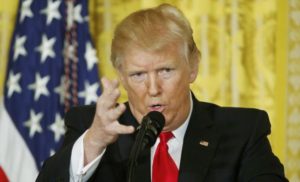Lordy, what a presser yesterday! There was a lot for us to work on, but Trump gave an interesting answer to a challenge.
First, the challenge. In the opening remarks and in the Q&A, Trump swung back to talking about the election. He said his 306 electoral votes to Clinton’s 232 was the largest win since Ronald Reagan’s in 1984. However, Obama won more electoral votes in 2008 and 2012, Bill Clinton won more in 1992 and 1996 and George H.W. Bush won more in 1988. So much for historic — at least he beat W’s 2000. To this, Peter Alexander of NBC, after having corrected Trump on this, asked him:
Why should Americans trust you?
Trump’s replies were, from what I can gather from the audio:
I was given that information… I don’t know. I was just given it. We had a very, very big margin.
and
I was given that information… Actually, I’ve seen that information around. But it was a very substantial victory. Do you agree with that?
To the last bit, Alexander replies,
Well, you’re the President.
The last is interesting, if only because it’s an elision of instituional authority with cognitive authority. But the more interesting feature is that Trump’s best reply to being caught out on a falsehood is (a) to say he’s just reading what’s written for him, and (b) to say he’d heard it before. Of course, neither is a reply to the question of whether he’s reliable.
That he reads what’s written for him is not a relevant reply, since the question could be then put to: why should we trust the things you read? To the latter, the issue isn’t whether he’s heard it before (there are many untrustworthy rumors and things people say), but whether they are credible.
I think these must be something like weak ad populum arguments, to the effect:
It’s been said/written that p
Therefore, p
The bridge principle, like with ad populum arguments, must be something along the lines If people are saying it, that’s reason to believe it’s true.
The problem with all ad populum arguments is that they are very weak inductions. Moreover, if you don’t know who said it, then they aren’t really even cases of believing on the basis of testimony — it’s just that you’d heard it. Generally, on-record testimony is better evidence, at least because people can be held responsible for their assertions.

Maybe Alexander’s reply “You’re the president” was meant not as an acceptance of Trump’s “it was a very substantial victory”: Possibly, he meant it in the sense of “It was at least a victory” or “Your result was good enough so that now you’re the president”.
But I haven’t watched or listened to the press conference, so maybe Alexander’s intonation makes this interpretation implausible.
Good grief.
This is a thing with him. When confronted with a better interpretation of his claim that Obama and Clinton “literally” founded ISIS, he replied, “people are liking it.”